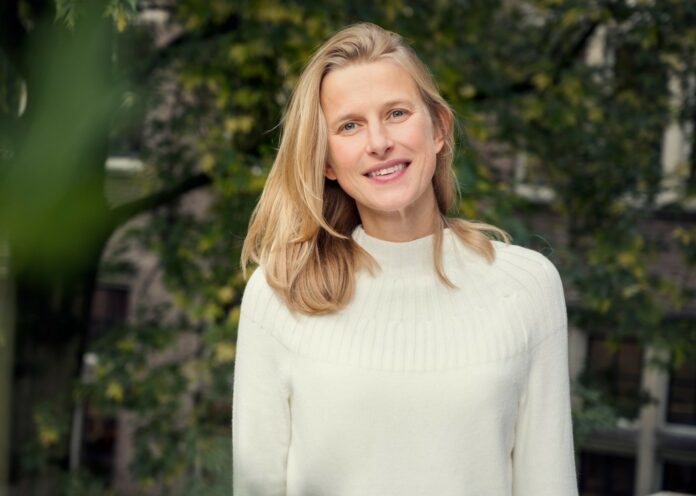Rebekah Braswell is founding member and CCO of Amsterdam-based impact enterprise Land Life Company. Headquartered in the Netherlands, with a team of 40+ spread around Europe and the US, the scaleup is on a bold mission to help restore 2 billion hectares of degraded land globally – the size of the US and China combined. Quite an admirable mission, indeed.
Through its proprietary technology, such as ‘Cocoon’ which is a 25-liter water reservoir that nurtures a seedling with all it needs for surviving, or its GPS planting-based routines, it makes reforestation more data-driven, cheaper and more efficient. Land Life Company has been attracting corporations, NGOs and governmental organizations as clients – all of them interested in reducing their carbon footprint through the offset provided by their reforestation and land degradation recovery projects.
We spoke with founding member Rebekah about their growth, reforestation projects and landing funding. If you’re part of an impact startup, or are thinking of ways to bring environmental causes in your startup, then read on!
Hi Rebekah, thank you for joining us. First up, what are the methods and technologies you’re using to step up to the challenge of restoring 2 billion hectares of degraded land?
At Land Life Company, we leverage pioneering technologies to plant trees at scale and maximize the impact of our reforestation efforts. We use a range of tech – from monitoring applications and remote sensing, to drones and satellites – to collect extensive data on tree health. This provides us with the insight we need to grow more resilient trees and helps us develop algorithms for future planting designs.
Continuous improvement in the field is really important to us as we want to make sure we are as effective as possible, especially as we continue to scale up. By planting thousands of hectares of forests, we are able to remove significant amounts of CO2 from the atmosphere, while boosting biodiversity and rebuilding habitats at the same time. In addition, the local communities we work with benefit from the reforestation and restoration of their land, as we specifically work on degraded land lost to wildfires, over-farming and urbanization.
Which personal experiences contributed to that eureka moment when you realized that Land Life Company would survive as a company and that you could achieve your bold goals?
When companies started making significant multi-year commitments to plant trees. There has been a real shift from companies treating the environment as a CSR initiative towards integrating climate action into core company brand and operations. At this point, we knew reforestation was not just a trend, but a commitment that could help us realize our bold goal to restore the world’s 2 billion hectares of degraded land, which is the size of the US and China combined.
Reforestation is becoming a key tool for companies to mitigate the impact of their business operations and to engage their employees and customers. And more and more companies are seeing reforestation as an extremely effective way to remove CO2 from the atmosphere and become carbon neutral.
How many reforestation projects have you started? How can print, carbon mitigation and greenhouse gas compensation become top priorities for SMEs around the world?
We currently have around 20 projects – on four continents. Our large-scale plantings take place in Spain, the US and Australia.
We want to make reforestation possible and accessible for companies small to large. Companies should feel confident that investments in reforestation will help them take climate action in a high impact and credible way. This is one of the reasons why we put a lot of effort in making our projects as transparent as possible. All our customers have access to their reforestation projects through our global reforestation dashboard, GAIA. Here, we share all data supporting their impact claims. This includes the species, carbon capture and vigor of all their trees as well as planting reports. We provide all this information in a shareable format to help our customers engage with their stakeholders.
Have you reached the break-even point already? Do you plan to raise more money in 2021 – and what will this money be used for?
We have reached our break-even point, and we closed an investment round in 2020 of 6 million. This capital is being used to accelerate our technical agenda, which includes investing in data collection, as well as increasing the scale, speed and efficiency of our plantings. It is also helping us to explore other geographies for our projects.
What has been the most challenging project by Land Life Company so far?
In collaboration with Lundin Energy, we will plant 8 million trees in multiple geographies in the coming years. For such a large-scale effort, we are increasing all our resources to access land, optimize planting windows and cultivate enough high quality, diverse native seedlings. This also means we are looking into different geographies and are forming new local partnerships. Everything we have done previously has built up to this point, and we are so excited to be taking on this large-scale challenge.
How do you see the company, your team and the market in 5 years?
We think climate solutions will continue to grow as a sector. Products will be better defined, measured and investible and buyers will become more sophisticated. We hope to see more companies enter the space to drive competition and therefore innovation in the market. As for us, we will continue to keep pushing boundaries, develop new technologies and scale up our projects worldwide.
In the 2021/2022 planting season we will be planting well over 3 million trees. By 2025, we hope to have restored over 30,000 hectares of degraded land. In addition to the impact that we are creating with our own projects, we hope that Land Life technology and approaches will help others and unlock the potential of large scale reforestation worldwide.




